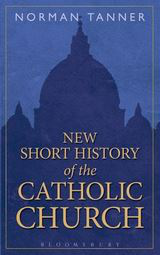Book: New Short History of the Catholic Church' by Norman Tanner

THE NEW SHORT HISTORY OF THE CATHOLIC CHURCH by Norman Tanner published by Bloomsbury
Norman Tanner has given us a learned and impressive survey of two thousand years of history in a mere 239 pages. Yet this reviewer found it strangely bloodless. The most disastrous and dramatic events - the split with Constantinople in 1054 and the beginning of the Reformation in 1517 - are handled with the same measured calm as less traumatic or important milestones.
There is little to convey the misery of centuries of sectarian strife following the Reformation, yet it couldn't be more topical. It could be argued that only by recognising the devastation caused by these centuries of carnage that we might appreciate the European Union's unique achievement: decades of peace and prosperity. This year's Global Peace Index yet again ranks Europe as the world's most peaceful region, a fact that should inform today's debate about membership of the European Union.
In the early parts of his survey, Tanner carefully and admirably explains the tight rope trod by the Church, balancing the demands of emperors and rulers with the need for the Church's co-existence with temporal power. "How far can the Church remain true to Christ's teachings while aligning itself with the ruling elite?" seems to be the persisting question. However, he stops too soon, drawing back from illuminating the more recent compromises made by pontiffs. Surely, this remains one of Christianity's great dilemmas. Yet there is almost nothing about the Church's sanctioning of the brutality of the Spanish conquistadors; any visitor to Mexico is uncomfortably aware of the murals vividly depicting the mass murder of indigenous people by soldiers, with priests standing at their side.
Tanner also minimises the way in which the Church backed Italy's genocide in Abyssinia, or its embrace of Franco in Spain - with the exception of priests and nuns in the Basque Country. He does not consider the persisting controversy about Pius XII's role during World War Two, or the remarkable courage of individual European priests and nuns who were killed for defying Fascism.
The impact of liberation theology in Latin America is barely mentioned. Nor does he consider Rwanda where the Church was complicit in the 1994 genocide. There were remarkable priests and nuns who sacrificed their lives to protect the Tutsi minority, but the Church hierarchy and most of its priests stood firmly with the prevailing powers, even encouraging Tutsi to seek shelter in their churches, and then alerting the Hutu militia who arrived to massacre them in their hundreds of thousands.
Instead, Tanner offers regrets about colonialism, which is all very well, but he should also mention that Catholic missionaries were instrumental in educating generations of Africa's future leaders, in largely stamping out child sacrifice, and in tackling polygamy. Nor does he point out that the Catholic Church now provides more than a quarter of all the medical care in Africa, surely an astonishing achievement, and a poignant illustration of putting Christ's words into action.
There is only an elliptical reference to the child abuse scandals rocking the Church, depleting its wealth, and emptying its pews in parts of the global north. Nor is there recognition that the Vatican's Mafia connections cause disquiet, and continue a long tradition of sometimes outrageously corrupt and morally questionable behaviour by pontiffs and other leaders. This complacency does not serve the subject matter well. It detracts from what is otherwise a fascinating and educational tome.


















